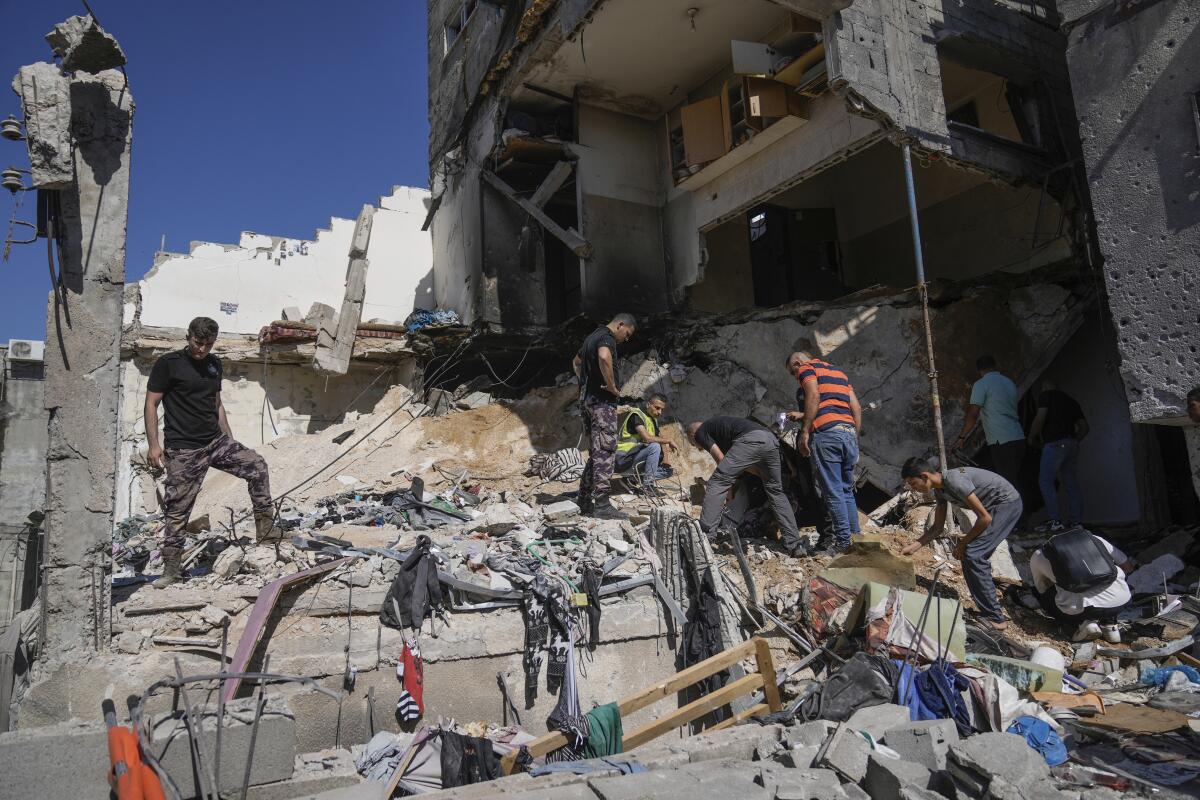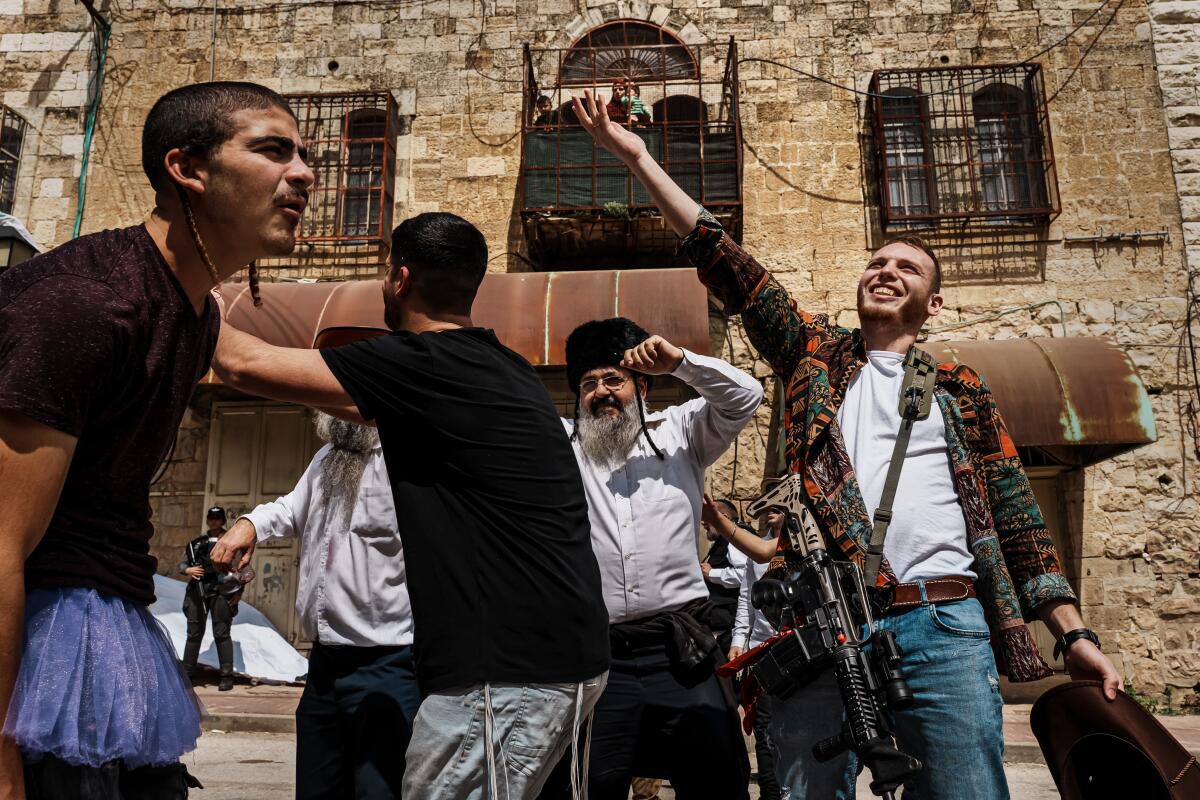West Bank occupation at the center of the violence at L.A. synagogue

- Share via
The recent violence at the Adas Torah synagogue in Los Angeles was rooted in a decades-long international battle over the expansion of Jewish settlements on land Israel seized and occupied during its 1967 Six Day War with Arab states.
The latest skirmish in that battle — which has been at the center of Israeli-Palestinian animosities — broke out June 23 when pro-Palestinian demonstrators, protesting against a real estate promotional event in which at least one company was offering properties for sale in the occupied West Bank, clashed with pro-Israel counterprotesters.
Building settlements in the West Bank is considered by many countries to be a violation of international law and threatens the prospects that Palestinians will one day have an independent country as part of a two-state solution. But the Israeli government of Prime Minister Benjamin Netanyahu has consistently resisted U.S. and international pressure to stop settlement building. The government is reportedly considering legalizing five more settlements in the West Bank.
The conflict over the fate of the occupied territory intensified in October when Hamas militants attacked Israel, leading to the ongoing war in Gaza. The future of the West Bank, where Jews have purchased property for decades, was quickly drawn into the conflict as leading figures in Israel’s right-wing government called for protecting Israel by expanding settlements on biblical territory Jews refer to as Judea and Samaria.

Netanyahu’s strategy, which has been embraced with fervor by nationalists and ultraconservative Jews, is to create a patchwork of Israeli settlements to block the forming of a contiguous Palestinian state.
In late June, a real estate venture called My Home In Israel advertised homes for sale at the event at Adas Torah. An archive of the website for My Home In Israel showed properties listed for as much as $4.1 million in Jerusalem, Tel Aviv and in the West Bank settlements of Ariel and Efrat, which was established in the 1980s and has stone homes and the air of a Southern California neighborhood.
My Home In Israel could not be reached for comment. Other companies, including the similarly named Home In Israel, which is run by Julian Shapiro, do not sell properties in the West Bank, Shapiro said. Since Hamas attacked Israel there’s been a “big, big rise” in interest by American Jews to invest in the country, he said. Much of that, according to real estate developers, is driven by Jews wanting to show solidarity with Israelis, growing antisemitism, and opportunities for those seeking long-term investments.
“America is our biggest market right now,” said Shapiro, who has been brokering Israel properties from his base outside Tel Aviv to clients around the world for 24 years. “We would never sell a property in the West Bank. We don’t think it’s the right thing to do.” He said he follows the protests and political sensitivity in the U.S. around the occupied territories, suggesting that he doesn’t want to be unfairly targeted by protesters: “We don’t want to advertise because it causes all kinds of havoc.”
Marketing programs in Canada and the U.S. by the Israeli Real Estate Event have elicited protests this year by pro-Palestinian demonstrators. A promotion at a New York synagogue was canceled over fears of unrest. The majority of properties offered at the promotions, which connected potential buyers with mortgage brokers, lawyers and builders, were within Israel’s legal borders. The West Bank settlements of Efrat, Neve Daniel and Maale Adumim were also advertised, according to a flier cited by the Times of Israel.
An ad for the event, which was organized by Gidon Katz, a global promoter of Israel real estate, read: “In a world where uncertainty looms and anti-Semitism shows its face more boldly than ever, the decision to invest in a home in Israel is not just wise — it’s exhilarating!”
Tensions around West Bank lands are unlikely to ease. Politicians and Jewish community groups condemned the violence at Adas Torah as an act of antisemitism. There was criticism of police tactics from both groups, and U.S. Atty. Gen. Merrick Garland said his office would investigate.
The West Bank — about the size of Delaware— was seized from Jordan in the Six Day War. An estimated 500,000 Israelis — up from 300,000 in 2010 — live in enclaves among about 2.7 million Palestinians. About 40% of the West Bank is run by the semiautonomous Palestinian Authority, which receives much of its funding from Israel.
The territory has become increasingly violent, and international officials worry that further expansion of Israeli settlements will open a second front in the Gaza war.
“Settler violence and settlement-related violations have reached shocking new levels, and risk eliminating any practical possibility of establishing a viable Palestinian state,” United Nations High Commissioner for Human Rights Volker Turk said in a statement in March. At least 500 Palestinians in the West Bank have been killed by Israeli forces — and some by settlers — since October, according to the Palestinian Authority Health Ministry.

The Hamas-led attack on Israel, which killed some 1,200 people, shook Israel’s sense of security. Israel retaliated with a war in Gaza that has killed at least 37,900 Palestinians, according to the territory’s Health Ministry, and devastated the enclave.
That has emboldened right-wing nationalists to push for a more aggressive occupation of the West Bank, including ragtag outposts that fly tattered flags and dot hilltops around Palestinian orchards and grazing lands.
The Israeli human rights group B’Tselem has said: “In order to expand and consolidate control over the lands it occupied, Israel has applied myriad military, civilian, legal and administrative measures through which it has torn apart Palestinian space, divided the Palestinian population into dozens of disconnected enclaves and unraveled its social, cultural and economic fabric.”
More than 250,000 Palestinians were displaced from Gaza and the West Bank in 1967. Despite years of global condemnation, Israel disputes that the West Bank settlements are illegal. It has taken a harder stance that threatens to incite wider Middle East conflict.
Ultraconservatives in the Netanyahu government claim that the Palestinian Authority can no longer be trusted to administer its part of the West Bank: The Palestinian Authority has “joined Hamas in trying to harm Israel in Israel and the world, and we will fight it,” Finance Minister Bezalel Smotrich said in a statement published in the Jerusalem Post. “For those who needed proof, we got it on October 7. A Palestinian state in the heart of Israel is an existential danger; I will not allow such a disaster to be brought upon the State of Israel.”
An earlier version of this story incorrectly referred to ‘“Palestinian lands” in the West Bank. The land in question is disputed territory seized from Jordan in 1967 and occupied by Israel. Palestinians want it for a future state.
More to Read
Sign up for Essential California
The most important California stories and recommendations in your inbox every morning.
You may occasionally receive promotional content from the Los Angeles Times.











